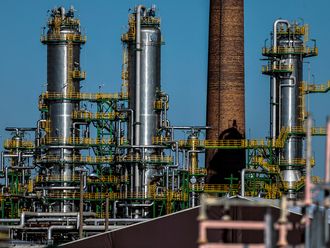Dubai: Volatility in the UAE’s equity markets is likely to continue in coming weeks until the new year, when fund managers allocate fresh money to their portfolios, industry participants said.
“We still have nervous investors selling into rallies, and it may take a while for confidence to return to the market,” said Saleem Khokhar, head of equities, National Bank of Abu Dhabi Asset Management Group.
On Sunday, the Dubai Financial Market General Index shed almost all of the gains registered in 2014, after losing more than 15 per cent on Thursday and Sunday.
“We should see more volatility for a few weeks due to impact of falling oil prices. For the time being, we have a few listed companies directly related to oil. There won’t be direct impact on these companies, but there could be indirect impact through lowering of budgets,” said Sebastien Henin, head of asset management at The National Investor.
On Monday, crude oil jumped the most in two weeks on signs output may contract from two nations accounting for about 9 per cent of Opec production.
Oil fell into a bear market this year amid the highest US production in three decades and slowing growth in global consumption. Prices have fallen about 20 per cent to the lowest in five years since the Organisation of Petroleum Exporting Countries decided not to cut production to tackle the glut at a November 27 meeting. The group has pumped more than its output target of 30 million barrels a day for the last six months.
“There would be a challenge if we see lower levels for crude oil. We would start to see austerity measures if crude hits $50,” said Jaap Meijer, managing director with Arqaam Capital. “Oman, Bahrain look most vulnerable among the GCC countries to falling crude prices.”
“We won’t be surprised in coming week’s fresh money coming into market for fresh bargains. Fund managers, when they start allocation of funds to portfolio, may allot fresh money to UAE markets,” said Henin.
Most of the stocks have fallen to attractive valuations, market experts feel.
The UAE, which is a part of the MSCI’s emerging market index, witnessed bouts of foreign money into its capital market post its upgrade. This move was later followed by S&P Dow Jones Indices.
Industry participants expect billions of dollars to come in form of capital flows. “Investors would target high quality names like Emaar Properties, and Emaar Malls Group among others,” Henin said.
Analysts are also bullish on the banking sector especially, First Gulf Bank, Abu Dhabi Commercial Bank.
“This is a good point to start building exposure to UAE equity markets. The banking sector is quiet attractive and real estate,” said Khokhar.
Profitability of the UAE’s banking sector will continue to remain stable as margin pressures are moderated by asset-quality improvements, recoveries and asset growth, according to credit rating agency Moody’s.
On funding side, over the outlook horizon, analysts expect strong deposit growth in the UAE to increase the contribution of customer deposits to around 65 per cent to 70 per cent of total assets. Despite significant contractual maturity mismatches, historically, most of these deposits have been stable during past crises.
The rating agency expects net earnings to remain strong over the outlook period. Both Dubai and Abu Dhabi-based banks will continue to benefit from lower loan-loss provisions because of declining bad loans, higher problem loan recoveries and settlements because of improved property prices, and modest asset growth.












